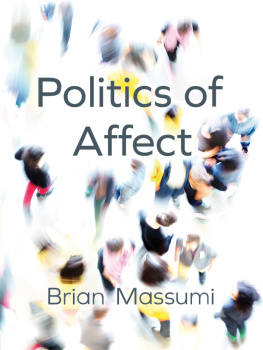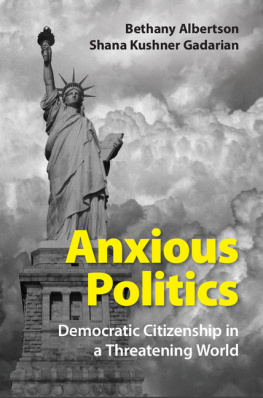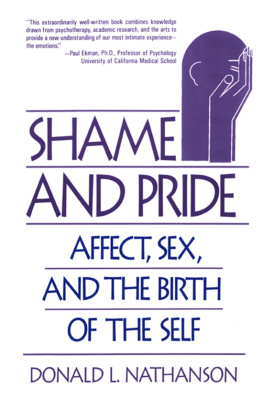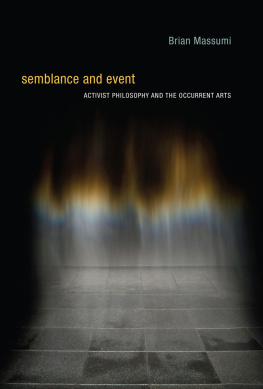
Copyright Brian Massumi 2015
The right of Brian Massumi to be identified as Author of this Work has been asserted in accordance with the UK Copyright, Designs and Patents Act 1988.
First published in 2015 by Polity Press
Polity Press
65 Bridge Street
Cambridge CB2 1UR, UK
Polity Press
350 Main Street
Malden, MA 02148, USA
All rights reserved. Except for the quotation of short passages for the purpose of criticism and review, no part of this publication may be reproduced, stored in a retrieval system, or transmitted, in any form or by any means, electronic, mechanical, photocopying, recording or otherwise, without the prior permission of the publisher.
ISBN-13: 978-0-7456-8981-4
ISBN-13: 978-0-7456-8982-1 (pb)
ISBN-13: 978-0-7456-8985-2 (epub)
ISBN-13: 978-0-7456-8984-5 (mobi)
A catalogue record for this book is available from the British Library.
Library of Congress Cataloging-in-Publication Data
Massumi, Brian.
The politics of affect / Brian Massumi.
pages cm
Includes bibliographical references and index.
ISBN 978-0-7456-8981-4 (hardcover : alk. paper) ISBN 0-7456-8981-7 (hardcover : alk. paper) ISBN 978-0-7456-8982-1 (pbk. : alk. paper) ISBN 0-7456-8982-5 (pbk. : alk. paper) 1. Affect (Psychology) 2. Political psychology. I. Title.
BF531.M324 2015
128.3dc23
2014043773
The publisher has used its best endeavours to ensure that the URLs for external websites referred to in this book are correct and active at the time of going to press. However, the publisher has no responsibility for the websites and can make no guarantee that a site will remain live or that the content is or will remain appropriate.
Every effort has been made to trace all copyright holders, but if any have been inadvertently overlooked the publisher will be pleased to include any necessary credits in any subsequent reprint or edition.
For further information on Polity, visit our website: politybooks.com
Preface
The politics of affect: the phrase is somewhat redundant. Affect, as it is conceived in this book, is not a discipline of study of which the politics of affect would be a subdiscipline. It is a dimension of life including of writing, including of reading which directly carries a political valence.
The interviews that follow do not purport to present a comprehensive treatment of the field of affect. Neither do they present an introductory encapsulation although it is hoped that the dialogic format renders the ins and out of affect more immediately accessible than the academic format. They are an invitation to voyage. Their aim is to map a passage for thinking through the intensities of feeling that fill life, and form it, across its ups and downs. Thinking through affect is not just reflecting on it. It is thought taking the plunge, consenting to ride the waves of affect on a crest of words, drenched to the conceptual bone in the fineness of its spray. Affect is only understood as enacted. This book hopes to enact affect conceptually for the reader through its stream of words.
The account developed here makes no claim to objectivity or general applicability. What would an objective or general approach bring to the singular qualities of life that compose its affective dimension? Stilling. Dullening. Dead disciplinary reckoning. The aim is not to convince with claims of validity, but rather to convey something of the vivacity of the topic: to invite and to incite the reader towards thought experiences pitching off-chart from the pages of the book, on a course of their own beyond its ken. To think through affect is to continue its life-filling, life-forming journey. A concept, Gilles Deleuze once said, is lived or it is nothing.
The angle of approach pursued here can be described as that of process philosophy in its widest sense. What the thinkers to whose work the discussions regularly return Henri Bergson, William James, Alfred North Whitehead, Gilbert Simondon, Flix Guattari, Gilles Deleuze have in common is construing the task of philosophy as understanding the world as an ongoing process in continual transformation. It is not concerned with things certainly not in themselves so much as with things-in-the-making, in James's famous phrase. It takes change as primary, and sees the regularities of life as temporary barrier islands of stability in stormy seas. This is the first sense in which the process philosophy take on affect carries a political dimension: what it is primarily about is change. The concept of affect is politically oriented from the get go. But moving it onto a properly political register the arena of social order and reorderings, of settlement and resistance, of clampdowns and uprisings is not automatic. Affect is proto-political. It concerns the first stirrings of the political, flush with the felt intensities of life. Its politics must be brought out. The conceptual project running through this book is to bring out the politicality of affect, constructing for it an expression that honours its processuality.
The immediately political dimension is also built into the base definition of affect informing process approaches like the one enacted through these interviews. This definition, deceptively simple, was formulated by Spinoza: affect is the power to affect and be affected. This definition recurs throughout the book like a refrain. Each time it occurs, it calls forth helper concepts, in increasing variety. These also recur, and together they begin to weave a conceptual web for thinking through affect. The formula to affect and be affected is also proto-political in the sense that it includes relation in the definition. To affect and to be affected is to be open to the world, to be active in it and to be patient for its return activity. This openness is also taken as primary. It is the cutting edge of change. It is through it that things-in-the-making cut their transformational teeth. One always affects and is affected in encounters; which is to say, through events. To begin affectively in change is to begin in relation, and to begin in relation is to begin in the event.
This brief itinerary already illustrates a characteristic of the processual concept of affect that distinguishes it from the general ideas that are the standard currency of thought, and upon which the traditional disciplines of knowledge are built. The concept of affect is transversal, in Deleuze and Guattari's understanding of that term. This means that it cuts across the usual categories. Prime among these are the categories of the subjective and the objective. Although affect is all about intensities of feeling, the feeling process cannot be characterized as exclusively subjective or objective: the encounters through which it passes strike the body as immediately as they stir the mind. It involves subjective qualities as directly as the objects provoking them, or with which they move. It concerns desire as much as what is imperatively given; freedom as much as constraint. Thinking the transversality of affect requires that we fundamentally rethink all of these categories in ways that include them in the event, together. It requires honing concepts for the mutual inclusion in the event of elements usually separated out from it, and from each other. A simple mix and match of received categories is not enough. An integral reforging is necessary. This is complicated by the fact that although affect's openness is unconfinable in the interiority of a subject, to take one of the concepts in need of restaging, it is at the same time formative of subjects. Although affect fundamentally concerns relations in encounter, it is at the same time positively productive of the individualities in relation. In its transversality, affect is strangely polyvalent.
Next page











